- Home
- Bianca Blythe
Don't Tie the Knot (Wedding Trouble Book 1) Page 7
Don't Tie the Knot (Wedding Trouble Book 1) Read online
Page 7
“She redesigned our garden at home three times,” Mr. Butterworth said, his voice brimming with fatherly pride. “Every summer a new design. I think she wants me to become a deacon just so she has a larger garden to work with.”
Some expression changed in Mrs. Butterworth, and she gestured toward her daughter. “Do you not find her pretty as well, My Lord?”
“Er—quite pretty,” Hamish said, conscious his voice felt hoarse, and not daring to look in Callum’s direction. Well. He could hardly say that his brother’s betrothed was not pretty.
Unfortunately contemplating her physical features made him remember exploring those same physical features last night, and that was not something he should be doing in the parlor, with her parents, sister, and fiancé in the room.
“I do hope you will remain in London. You must dance with her. The waltz. It’s more romantic.”
Hamish blinked.
“Romantic dances are always the best sort.” Mrs. Butterworth nodded, as if she’d simply declared a preference for a particular park.
“I doubt the waltz in particular would be appropriate,” Hamish said. “Perhaps we could attempt a cotillion?”
“Do you not waltz, My Lord? Perhaps Mr. Butterworth might give you lessons. I have found him an excellent waltzer.”
The two exchanged such affectionate glances that something in Hamish’s heart panged. The room might be small, and no fire blazed in the hearth, but the atmosphere exuded warmth.
“I waltz,” Hamish admitted.
“Splendid.” Mrs. Butterworth clapped with such vigor that she seemed to bounce on the sofa cushions. “Then it’s settled.”
Miss Butterworth’s face paled.
“I mean, she is going to be my brother’s wife,” Hamish said. “I thought a cotillion might be considered more appropriate.”
Too late it occurred to him that keeping Miss Butterworth from dancing excessively romantic dances with his brother might be in Hamish’s best interest.
“Oh, no.” Mrs. Butterworth shook her head adamantly. “Miss Charlotte Butterworth is to be your new sister.”
“I did not have an old one,” Hamish grumbled.
“Even more splendid! But what I mean is that your brother is not planning to marry my older, auburn-haired Georgiana.”
And then he understood.
He’d attempted to bribe the wrong sister.
No wonder she’d refused to be swayed.
“You mean—” Hamish’s Adam’s apple seemed to somersault.
“Are you sure you’re quite well?” Callum placed a floral bouquet back on the table, and his voice was filled with such brotherly concern that Hamish had the unfortunate realization that his shock must be blatantly evident.
“I’m fine,” Hamish said, though his voice sounded of the strangled variety. “I’m just surprised.”
Callum frowned. “But why would you think I was marrying her?”
Georgiana’s face pinkened, and outrage shot through Hamish’s body. There was nothing wrong with Georgiana. She’d make an excellent duchess, even if he had spent last night attempting to convince her of the contrary.
He glanced at the other Miss Butterworth. Charlotte. She was blonde, slim. He should have guessed that she would be Callum’s choice. She’d been retiring, calm.
And yet, having met Georgiana, he’d never once considered that his brother would marry the other sister.
“Dear Lord Hamish Montgomery,” Miss Charlotte Butterworth said, taking charge of the conversation. “How was your travel from Scotland? I trust that the weather was tolerable?”
“Tolerable.” He frowned. “The state of the sky does not impede on my enjoyment of things.”
“He never enjoys things,” Callum said, and the others laughed.
Hamish frowned. They shouldn’t laugh. Laughing was uncalled for.
He’d tried to bribe the wrong woman.
And worse, he’d kissed her.
Well. It might be difficult to ascribe the kiss as being too horrible. So far in London the kiss had been by far his best experience, though he could hardly admit that to the others who seemed determined to make pleasant conversation with him, as if such a thing could ever be possible after having discovered that one’s brother was ruining his life and that of future Vernons.
He gazed at the red-headed Butterworth.
And then averted his eyes away quickly, lest her mother, obviously in matchmaking mode, decided to expound more on the loveliness of her eldest daughter and the vast pleasure he would experience by repeating the steps of some dreadful continental dance with her.
Not that there might not be some pleasure in waltzing with her. Something about holding one hand on her waist and the other on her hand was not dreadful to contemplate, though in all likelihood, knowing her, she might be prone to grip his hand in an attempt to discern whether she might shatter it and to wear some form of hair belt around her waist to cause him discomfort.
At least it was less dreadful than the rest of the activities in London. He supposed he should be thankful no one had suggested that they go shopping in the Bond Street Bazaar for wedding attire.
Still.
The lassie could have told him. It was dashed embarrassing to have made a whole speech to the wrong woman. He’d been proud of his phrasing then and in all likelihood, he wouldn’t be able to repeat it to the same effect. It was difficult to make an impassioned speech to someone after spending the afternoon discussing varieties of teas and methods of drinking them.
Besides, how would he even access Miss Charlotte Butterworth’s chamber? He could hardly go about traipsing the corridors of the Butterworths’ townhome, no matter how politely they might converse about the weather. A house like this was bound to have more than one candlestick.
So far his attempt at stopping the wedding was not going well. He would need to contemplate other means. He scrutinized the room, and something in his gaze must have made his brother wary.
Callum placed his teacup on the table. “We will not stay long.”
“Naturally,” Mrs. Butterworth said. “I expect you will want to prepare for tomorrow’s wedding.”
Hamish thought quickly.
He couldn’t leave just yet. He needed to make some progress. He needed to spend less time focusing on Miss Georgiana Butterworth and more time in making Miss Charlotte Butterworth reconsider her hasty attachment.
There seemed to be hope. This was evidently a whirlwind romance, and any fool knew that whirlwinds never ended well.
He mused over the words of Callum’s maid, who’d possessed the supremely sensible name of Eliza, one that did not evoke half-dressed figures from antiquity.
She’d noted alcohol, unfaithfulness and dislike as deterrents. Naturally dislike could be disregarded. There was nothing dislikable about Callum. The man was a Montgomery after all, and he could hardly find another woman in the parlor who would say she had dallied with him.
But alcohol... He could do something about that. Hamish would be a fool to not take advantage of the fact that they were all drinking.
Of course, tea was not known for its poor effects, and Mr. Butterworth had listed all the virtues of the drink.
“I would like to try the green tea,” Hamish said.
Mr. Butterworth beamed. “Splendid. I was worried you might find it to be too strong.”
“Nonsense,” Hamish said. “I like a hearty taste.”
“You should see him eat black pudding,” Callum said.
“Well then.” Mr. Butterworth’s eyes glimmered. “You’ll probably like it more than I do.”
Hamish grinned and leaned back.
He’d brought a flask of alcohol with him. The very strongest sort. It would be easy to slip some of the drink into his brother’s cup. Callum was likely so inexperienced with green tea that he wouldn’t even realize that the strong, delicious flavor was not supposed to be there.
Soon they were given the tea.
Hamish stretched and dou
sed Callum’s tea with a heavy dose of special Scottish whisky, thankful for the towers of books. He strove to not smile when Callum raised the teacup to his lips.
“How do you like it?” Mr. Butterworth inquired.
“I enjoy it very much,” Hamish said.
“The man does seem pleased,” Mrs. Butterworth said merrily. “I do believe he does enjoy the tea. Who knew a man would crave a bitter taste to such an extent?”
“Oh, it’s much less bitter than I expected.” Callum downed his teacup with a rapidity not associate with the drink.
Hamish leaned back into his armchair. In no time Callum would feel rather less polished than was his tendency.
Chapter Ten
The duke seemed to be swaying, and Georgiana narrowed her eyes. His face was flushed, and the strands of his blond hair lay flat against his forehead, darkened in color as if he were battling a fever.
Or something more nefarious.
One didn’t live in slightly less than fashionable areas and not see someone drunk. The singing that graced the streets on the edges of Mayfair were never of the proper sort, sung by trained opera singers who’d had each note assessed by plump Italian masters who viewed the accomplishment of each note as a greater feat than any show of athletic prowess.
The singing in Norfolk seemed confined to sailor ditties, whether sung by actual sailors, refined men who were in their less sober moments still enthusiastic about their days at sea, or those who had never been to sea at all but had romantic urges toward piracy, best expressed in counting imaginary rum bottles and the merits of Spanish ladies.
The duke was not singing, but he had begun to whistle, and though he might be trying to impress Charlotte with his ability to carry a tune, it was not something he had done before.
The duke was also not known to stumble, but his eyes were narrowed, as if concentrating to reach the door, an exploit no doubt made more difficult by his sudden inclination to sway.
Papa shut his book, and his bland expression firmed. “Are you quite alright, Your Grace?”
“Yeth.” The duke waved his hand with such force he nearly tipped over. “A walking stick would be nice.” He turned to his brother, and his gaze developed a dreamy aura to which she was not accustomed. “Remember when we used to carve walking sticks from branches in the woods?”
“Ah.” Lord Hamish Montgomery gave a condescending smile. “That’s a sign of your great imagination.”
“That ith not true.” The duke’s face reddened.
“My brother is quite prone to fantasy,” Lord Hamish Montgomery said conversationally.
“He also seems prone to drink,” Papa said pointedly.
“Mr. Butterworth!” Mama gave an outraged sigh. “What exactly are you implying?”
“Just that,” Papa said. “He’s an imbiber. A topper. A—”
“He must have become inebriated,” the duke’s brother said. “I do apologize. It only happens when he is most bored.”
There was a silence.
“He must have had a flask,” Lord Hamish Montgomery said. “It is so very kind of your daughter to marry my brother.”
“Kind?” Mr. Butterworth’s eyes widened predictably, and Georgiana’s heart tumbled. The man was trying to besmirch the duke.
Lord Hamish Montgomery nodded. “Yes. Kind, given my brother’s propensity to alcohol.”
The silence continued, and Georgiana shifted her legs, contemplating whether she could contradict the duke’s brother.
“He’s no such thing. Our new son is sober and dutiful,” Mama said.
“He’s not your new son yet,” the duke’s brother reminded her parents.
“Perhaps His Grace is not my new son yet in a strict mathematical sense,” Mama conceded, “Though when one applies the law of averages...”
“How very true,” Lord Hamish Montgomery said. “How kind you are here given my brother’s propensity toward distemper.”
“Violence?” Mama’s eyes widened.
The duke’s brother’s face reddened, and he did not meet Georgiana’s eyes. “Well. Er—not precisely violence. But he knows how to grumble.”
“Ah, but so do I,” Mama said, her voice once again merry. “She’ll be quite at home, I’m certain.” Mama turned to Georgiana’s father. “Did you hear that, dear? My new son likes to grumble too. And you said I did it with too much frequency. But now it will help dear Charlotte’s marriage!”
“Good,” Papa murmured with the dispassion of a man who knew just which word to say.
“I want a walking stick,” the duke drawled from his settee.
“Mr. Butterworth, fetch the poor man a walking stick,” Mama ordered.
“But I haven’t got one,” he protested. “The pavement in London does not require it.”
“Our son is in pain, and you are spending the time boasting about your ambling abilities?” Mama’s face was stern, and Papa’s face crumpled.
“I didn’t mean—”
“Of course you didn’t mean,” Mama said. “You never mean, despite all the time thinking you claim to do with all those supposedly great philosophers to help you.”
Papa’s face reddened. “Perhaps a servant will have one.”
The servants were not in possession of a walking stick. Apparently they were also adept at walking, a fact that no doubt helped them maintain their positions, and none of them were in the habit of mirroring Beau Brummel’s expensive yet stark dress sense and were in possession of canes.
“How unfortunate that my brother is in an inappropriate state,” Lord Hamish Montgomery said with such innocence that Georgiana frowned.
Perhaps he was the brother of a duke, and perhaps she should attempt to act less impulsively, but Lord Hamish Montgomery couldn’t allow her parents and sister to have any unwarranted doubts about the duke.
“Are you by any chance referring to the fact that you put a strange substance in your brother’s drink?” Georgiana asked.
He widened his eyes, and she gave him her sweetest smile.
“Is that true, My Lord?” Papa asked, managing to convey both sternness and confusion.
The duke’s brother’s face whitened. Perhaps he was reminded of the fact that Papa was a vicar and had given morals a great deal of consideration.
“I do not approve,” Papa said, managing to convey such authority that Georgiana almost felt sorry for Lord Hamish Montgomery. Papa might be hoary-haired, but he could intimidate.
“Sibling teasing,” Georgiana suggested. “Am I correct?”
“Er—yes.” Lord Hamish Montgomery guided his brother from the room, making use of the sturdy arms which Georgiana wished she were not quite so aware of.
Chapter Eleven
London could not be relied upon to have nice weather, even in the midst of spring and even on important wedding days. So much of Georgiana’s time in London had been spent ducking under awnings and into coaches when sudden onslaughts of rain had hampered the daily stroll she shared with her mother and sister. The occasional evening ball and a townhouse they couldn’t quite afford, if the slim staff and plain food were anything to go by, seemed a poor compensation for the cozy vicarage they’d abandoned. This day, though, was different.
Sunbeams danced on every surface, illuminating buildings and branches with indiscretion. Once dour squares radiated magnificence, and even the Londoners smiled. The opulent coach, a cast off from her grandfather and splendid in a manner only achieved by people in the last century, rattled over the cobblestones, and everyone wore their finest attire. Mama had somehow managed to get Papa to try a more advanced cravat knot and she’d selected for the occasion a turban of such magnificence that she had to duck her head to best ensure the feathers’ continued beauty.
Georgiana smoothed the netting of her new canary-colored gown. Cheerful ribbons trimmed the hem. It was the finest dress Georgiana had ever owned.
“That dress is the most impractical thing I’ve ever seen,” Papa remarked. “That gauze can tear easily.�
��
“It’s fashionable,” Mama exclaimed.
“Only so women will need to see their dressmaker quickly again. Even the color is too light and susceptible to stains.”
“Georgiana will not eat anything until the wedding breakfast,” Mama said. “By which time her sister will be a duchess. Besides, she might always remain your little girl, but she is quite capable of getting through the wedding without the destruction of her attire.”
“Thank you, Mama,” Georgiana said.
“You needn’t be so surprised. I have been paying attention. After Charlotte marries her duke, you can marry the duke’s brother. It will make holidays so convenient.”
Just as quickly Georgiana’s spirits fell. “The man was attempting to make his brother drunk.”
“Attempting?” Papa snorted. “He succeeded.”
“Success is a virtue,” Mama declared.
“Not that sort,” Georgiana said hastily, hoping to convey satisfactory indignation without overly conveying that Charlotte’s new family was utterly unsympathetic.
“Besides, you noticed his action, my dear,” Mama said. “There seemed a definite spark between you too.”
On that Georgiana could somewhat agree, though she refrained from remarking that any spark derived from Lucifer, a person whom Lord Hamish Montgomery undoubtedly would find himself spending very much time with.
The coach slowed and rattled over the cobblestones, and the elegant columns of St. George’s portico came into view. Georgiana and Charlotte leaned toward the window. Charlotte’s veil fluttered with the additional movement, and her face remained somber.
A trickle of uncertainty moved through Georgiana at her sister’s expression, but Charlotte had a habit of being serious, and marriage must have its serious aspects.
“Sit down, Charlotte. You’ll crease your dress,” Mama said. “You wouldn’t want the dear duke to think you prone to gallivanting about in wrinkles. It would be enough to have him question your housekeeping abilities.”
“The duke will not be depending on her for housekeeping abilities,” Papa said. “She’s going to be a duchess.”

 The Earl's Christmas Consultant
The Earl's Christmas Consultant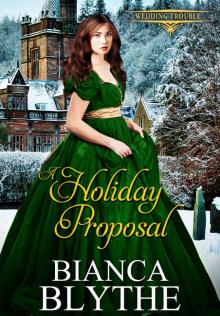 A Holiday Proposal (Wedding Trouble Book 6)
A Holiday Proposal (Wedding Trouble Book 6) The Earl's Christmas Consultant (Wedding Trouble Book 3)
The Earl's Christmas Consultant (Wedding Trouble Book 3) A Kiss for the Marquess (Wedding Trouble Book 5)
A Kiss for the Marquess (Wedding Trouble Book 5)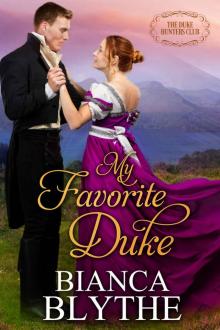 My Favorite Duke (The Duke Hunters Club Book 2)
My Favorite Duke (The Duke Hunters Club Book 2)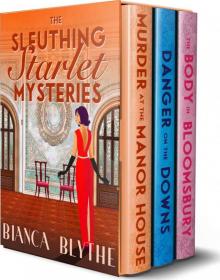 The Sleuthing Starlet Mysteries
The Sleuthing Starlet Mysteries Lords, Snow and Mistletoe
Lords, Snow and Mistletoe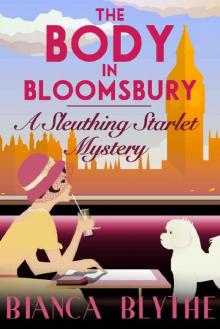 The Body in Bloomsbury
The Body in Bloomsbury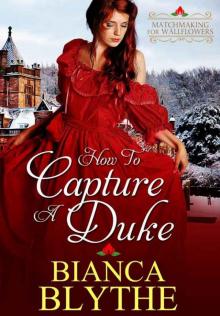 How to Capture a Duke (Matchmaking for Wallflowers Book 1)
How to Capture a Duke (Matchmaking for Wallflowers Book 1)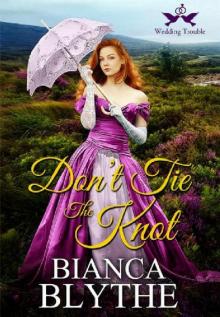 Don't Tie the Knot
Don't Tie the Knot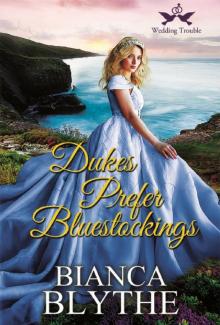 Dukes Prefer Bluestockings
Dukes Prefer Bluestockings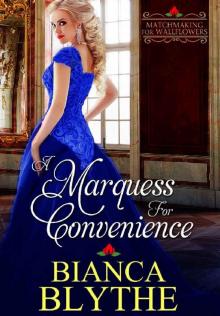 A Marquess for Convenience (Matchmaking for Wallflowers Book 5)
A Marquess for Convenience (Matchmaking for Wallflowers Book 5) Lords, Snow and Mistletoe: A Regency Christmas Collection
Lords, Snow and Mistletoe: A Regency Christmas Collection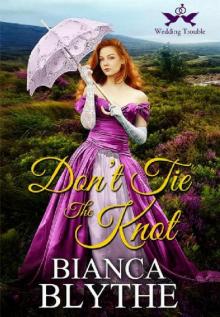 Don't Tie the Knot (Wedding Trouble Book 1)
Don't Tie the Knot (Wedding Trouble Book 1)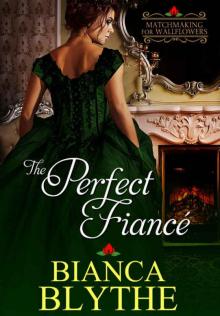 The Perfect Fiancé (Matchmaking for Wallflowers Book 0)
The Perfect Fiancé (Matchmaking for Wallflowers Book 0)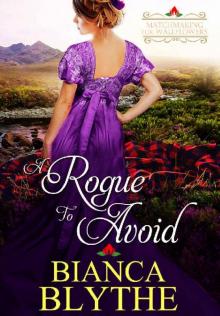 A Rogue to Avoid (Matchmaking for Wallflowers Book 2)
A Rogue to Avoid (Matchmaking for Wallflowers Book 2)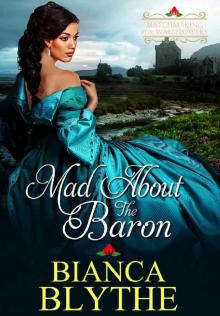 Mad About The Baron (Matchmaking for Wallflowers Book 4)
Mad About The Baron (Matchmaking for Wallflowers Book 4)